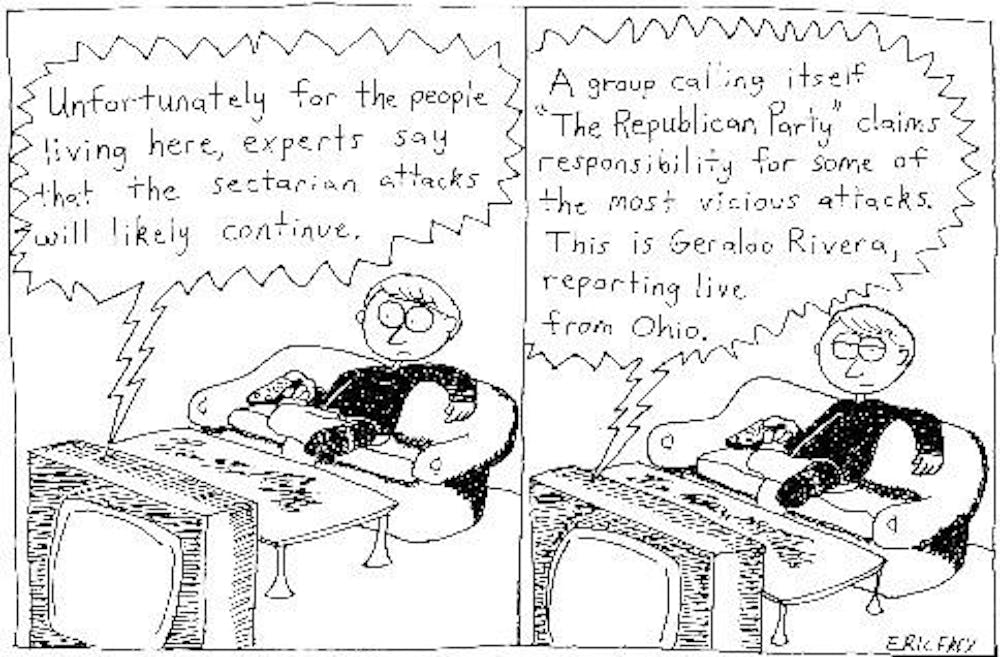
(Dan Chudzinski)
According to a recent poll by Harvard University's Institute of Politics, 32 percent of 2,546 18- to 24- year-olds surveyed said that there was a 50 percent chance that they would cast ballots this election season. While a turnout of this magnitude is itself poor, it does indicate a possibly better turnout by the younger demographic than has been seen in previous years. Unfortunately the chances for it happening are not good. Similar claims have been made over the past few election cycles and young voters continually disappoint in turnout. If young voters ever hope to make their voices heard in the halls of government, it is critical that they come out to vote, starting with the elections Tuesday, forcing elected officials to take into account their opinions and thoughts.
The U.S. Founding Fathers stressed the importance of a well-educated and active citizenry for the proper functioning of government. Even given the limited means of communication at the time, there was an expectation for citizens to be well-informed and active in politics. With the current avenues to access information, it is much easier for voters to educate themselves on what is happening in government nationally and locally and learn about the issues and candidates at election time. Even with these new resources voters still fail to participate actively.
Voting in the United States has some marked differences from voting in other countries. In some European states, like Italy, voting in elections is mandatory. In Iraq, scenes of citizens braving life or death to go out and cast ballots shows voting is a right to be cherished and not to be taken for granted. While voting in those states is seen as a civic duty, here voting has turned into a civic privilege that can be ignored. This is a sad turn of events and the young generation can change things by setting an example for greater voter participation.
Elected officials will continue to ignore the interests of the younger demographics until young voters decide to make their voices heard. Until then, officials can afford to ignore them and their ideas because they do not take advantage of the one sanction they have against elected officials - the ability to put officials in or out of office.
Additionally, it is important for voter participation to be active rather than reactionary. Active participation in politics is noted by a continued awareness of political issues and what policies elected officials are pursuing and supporting. Continued participation is critical because it helps keep politicians honest. If they know that voters are always watching, they will be more careful in responding to citizens' needs and serving the public interest, rather than their personal interests. Reactionary participation is marked by outcries from the citizenry when one incident of aberrant behavior comes to light. While an organized objection to that one action has the possibility to change outcomes, in the long term, voters do themselves a disservice. Officials know that even if they incur the short-term outrage of voters, the lack of turnout helps ensure their continued election and encourages them to ignore opinions of younger voters and pursue their personal benefit.
Miami students have experienced much of this with the proposed ordinance by Oxford City Council to ban outdoor drinking games. Students have been presented an opportunity to speak out about the ban at a City Council meeting Tuesday. While this temporary reaction to local politics may be enough to affect the ban on outdoor drinking games, voting and staying active in politics is the only way to make sure that such a situation does not occur again. Even though no City Council members are up for election this year, by voting en masse, students will send a message to their elected officials that younger voters do turnout and that addressing their concerns is critical to electoral success. Professors should also be part of the effort turn out young voters. The Student urges faculty to either spend a few moments to talk about the election with students during class, or at the very least, remind them to vote on the way out.
Some would argue that it is too difficult to stay knowledgeable about politics or feel that government doesn't listen to them, making their vote meaningless. Both attitudes threaten U.S. democracy and the prosperity and order it brings. If individuals feel that government ignores them, becoming more involved, not less, is the way to change the system. The effects of voter apathy are plain by looking at the rate at which Congressional House representatives are re-elected. The 2000 Congressional elections had the unsurprising result of 98 percent of representatives being re-elected. There are other reasons for incumbent advantage, from gerrymandering to the significant financial assets needed to run a campaign, but most of all voter apathy helps keep incumbents safe and sound in their positions.
The results of this Congressional stagnation are plain. No significant pieces of domestic legislation have been passed without significant pressure from the president or mass civil protest. In fact, Congress is complicit in giving much its power to the president. What Congressional members have been busy doing is selling their influence to interest groups in a wave of corruption that is startling. Republicans look ready to be dealt a massive electoral defeat and rejection in response. But, again, this reactionary response is not enough to change the way business is done in governing institutions. Without an active, interested electorate, the Democrats elected will fall sway to the same temptations of Republicans - a motivation to work for their personal interest rather than the public interest.
The United States is currently faced with a number of pressing problems, including global warming, oil dependency and a Social Security and health care crisis. The current Congress has decided that it will leave these problems to future generations. This makes it all the more critical for younger generations to become involved in politics and help to change the system.




